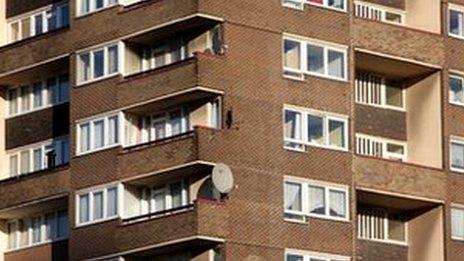David Cameron: Conservatives offering 'a good life' for all
- Published
- comments
David Cameron: "We are the party of working people"
David Cameron has said his aim is to guarantee a "good life" for British workers and families as he launched the Conservatives' election manifesto. , external
The prime minister said he wanted "to finish the job" of rebuilding Britain on behalf of "working people".
He pledged to pass a law to keep minimum wage workers out of tax, double free childcare to 30 hours a week and boost "right to buy" home ownership.
Labour said the Conservatives were the "party of the richest in society".
Key priorities
Conservative
Main pledges
- Eliminate the deficit and be running a surplus by the end of the Parliament
- Extra £8bn above inflation for the NHS by 2020
- Extend Right to Buy to housing association tenants in England
- Legislate to keep people working 30 hours on minimum wage out of tax
- 30 hours of free childcare per week for working parents of 3&4-year-olds
- Referendum on Britain’s EU membership
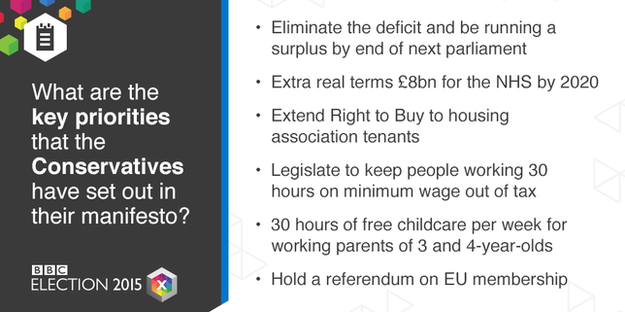
The Conservative launch in Swindon came the day after Ed Miliband put forward Labour's version - promising to improve the lives of Britain's workers and not to pay for any policies through additional borrowing.
In his speech, Mr Cameron said the Conservatives would build on the "solid foundations" laid by his government since 2010, proclaiming that Britain was "on the brink of something special" and warning that Labour would take the UK "back to square one".
"We are the party of the working people offering you security at every stage of your life," he said.
His goal over the next five years, he said, was to "turn the good news on our economy into a good life for you and your family".
"They're about realising the potential of Britain, not as a debt-addicted, welfare-burdened, steadily declining, once great nation, which is what we found. But a country where a good life is there for everyone willing to work for it."
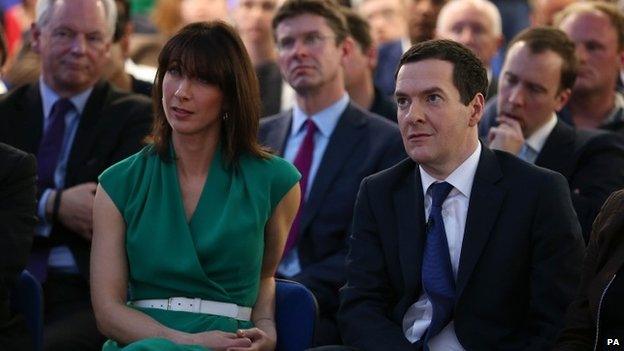
The 83-page document was launched at a event attended by senior Conservatives
Mr Cameron said the Conservatives had a track record of supporting working people, having taken thousands of people out of income tax altogether by raising the personal allowance to £10,600 and agreeing to extend this to £12,500.
A future government would go further, he said, by passing a law to ensure that anyone working 30 hours on minimum wage rates would continue to pay no income tax.

Analysis by political editor Nick Robinson
This week of political cross dressing goes on.
David Cameron tried to re-brand the Conservatives as the party of working people - the day after Ed Miliband claimed that Labour was the party of economic responsibility.
It is not just the language that has changed it is the tone.
Today the Tory leader tried to re-discover the rhetorical "sunshine" he was once associated with - with his promise to deliver "The Good Life" in a country which he claimed was on the "brink of something special".
So, gone is the "age of austerity". Gone too the warnings of red flashing lights on the dashboard. Gone all talk of difficult decisions.

But Mr Miliband said the Conservatives had "absolutely no idea" how this and other spending commitments, including a £350m pledge to double the amount of state-subsidised childcare for three and four year-olds, would be funded.
"The reality about the Conservatives is that they are the party not of working people, from first to last and always, they are the party of the richest in our society and that is absolutely the case with what they are saying today," he said.
'Screeching u-turn'
And the Lib Dems said the Tories' plans were a "total con" because there were no details of future cuts to public spending and welfare:
"I don't think a sudden, screeching U-turn where they now want to spray the country with warm words is going to in any way hide the fact that the Conservative Party wants to cut, cut, cut way beyond what is necessary," said leader Nick Clegg.
UKIP leader Nigel Farage said the manifesto was largely a "re-hash" of the 2010 version, pointing out that commitments on immigration and inheritance tax had not been delivered in the past five years.
The SNP called for more investment in the NHS, saying government policies had "penalised the poorest" since 2010.
In other election news:
The Green Party launched its manifesto, pledging to "take back" the NHS from the private sector and build 500,000 social rented homes
The Liberal Democrats promoted their own housing policies, which involve the government commissioning the building of new homes, and a pledge of at least 10 new garden cities in England and 300,000 new homes a year.
Nick Clegg has told the BBC he will not work with the Conservatives after the election if they insist on £12bn of welfare cuts
The latest Ashcroft and Populus opinion polls put both the Conservatives and Labour on 33%
The UK's inflation rate remained at zero in March
A key pledge of the Conservative manifesto is the extension of right to buy, a flagship policy of Margaret Thatcher's government in the 1980s, for tenants of housing associations - private, not-for-profit bodies that provide low-cost housing.
At the moment, council house tenants in England can buy their home at a discount of up to £103,900.
Under current rules, about 800,000 housing association tenants have a "right to acquire" their homes under smaller discounts, but the Conservatives would offer those people the same reductions as for those in local authority homes.
'Lack of detail'
And they would extend the scheme to those who currently have no purchase rights at all, estimated to be about 500,000 people.
The move would be funded by new rules forcing councils to sell properties ranked in the most expensive third of their type in the local area, once they become vacant, with every house purchased replaced "on a one-for-one basis".
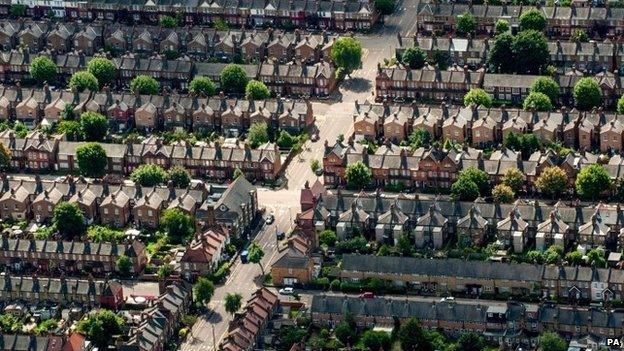
Campaigners have said the focus should be on increasing the supply of affordable housing
Critics have said the plan could cost close to £6bn and The Institute for Fiscal Studies (IFS) said housing associations would have to be "recompensed for selling their assets at below market value".
Paul Johnson, the director of the IFS, said this and other spending commitments had implications for the Conservatives' plans to eliminate the £90bn deficit in day-to-day spending by 2017-18, which would require "tens and tens of billions of pounds" in spending cuts or tax rises.
"Yesterday we did not get much detail from Labour about how much they want to cut," he said.
"Today we got a very clear sense that the Conservatives are going to have to do an enormous amount over the next three or four years but no sense at all about how they are going to do it."
Business groups welcomed Conservative backing for low taxation but called for more clarity over how its new commitments would be funded.
The CBI also warned that extending the right-to-buy scheme would not "solve the problem" of housing shortages while campaign group Crisis said the idea was "deeply worrying" as it would further reduce the amount of affordable housing.
Subscribe to the BBC Election 2015 newsletter, external to get a round-up of the day's campaign news sent to your inbox every weekday afternoon.
- Published14 April 2015
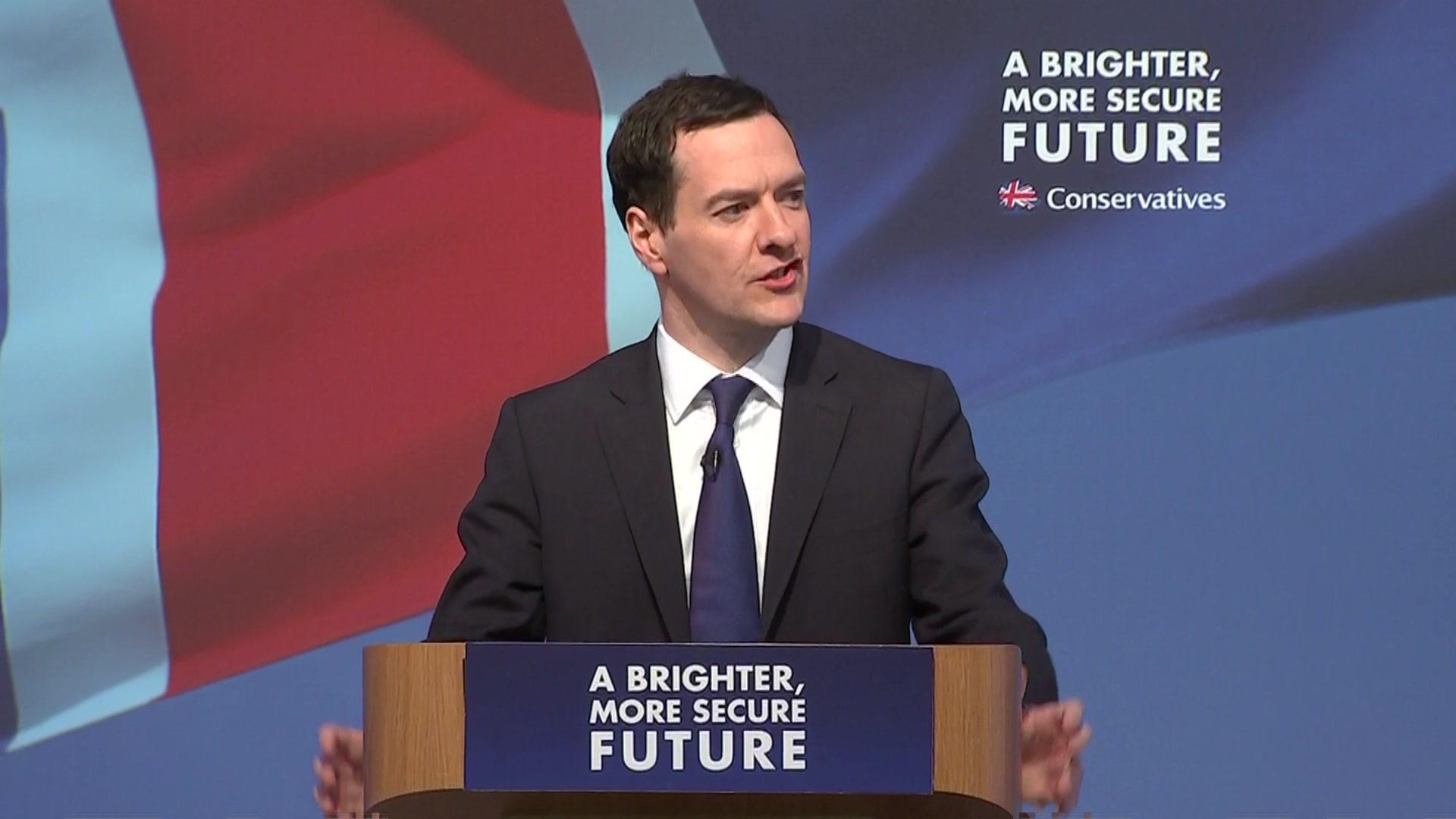
- Published14 April 2015
- Published14 April 2015
- Published15 April 2015
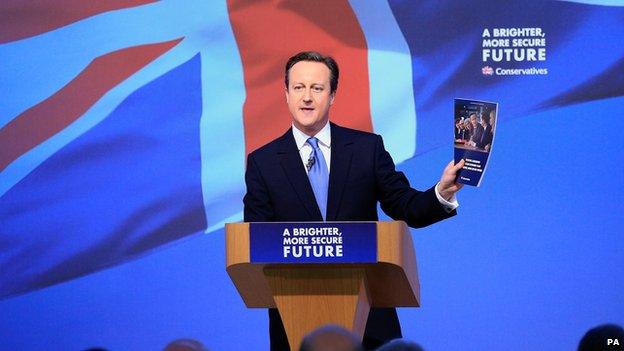
- Published12 April 2015
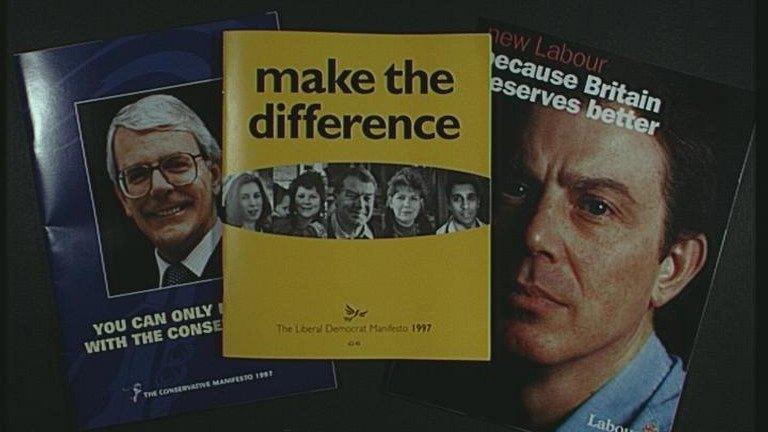
- Published13 April 2015
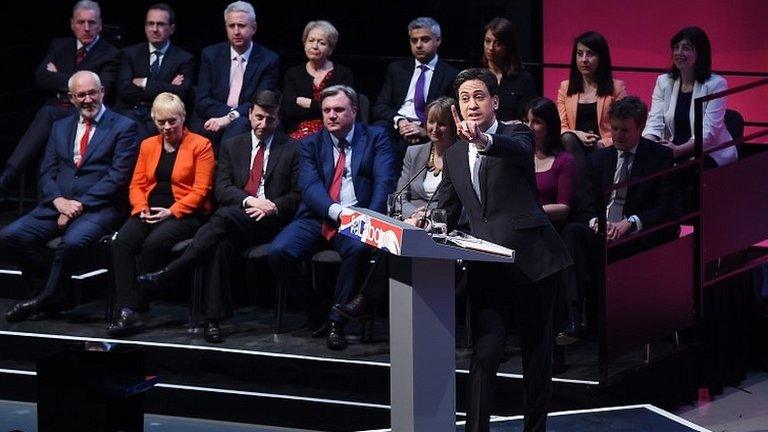
- Published13 April 2015
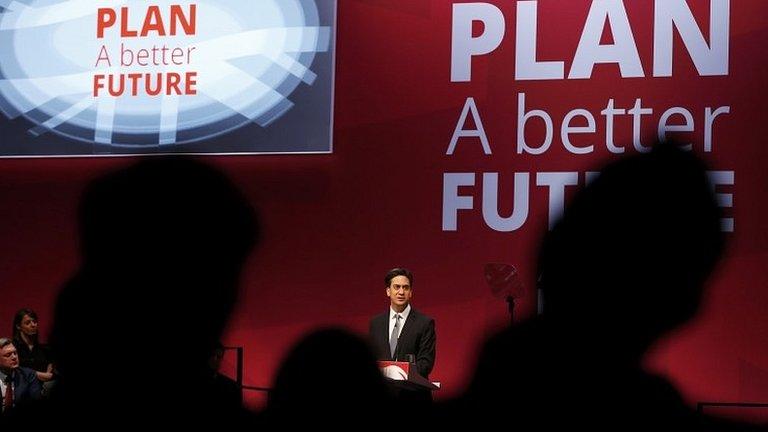
- Published3 July 2013
